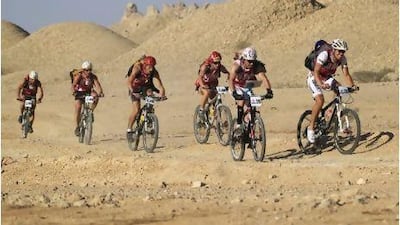AL AIN // Few teams emerged from day two of the six-day Abu Dhabi Adventure Challenge untouched by scrapes and blisters.
Before the sun rose yesterday, 200 athletes began their 5.5km run from their camp at the bottom of the Jebel Hafeet mountain, in Al Ain, to the official start of the race at a base checkpoint.
There to greet them were rows of mountain bikes, ready to carry them to the summit. Once the competitors reached the top, they then had to use a combination of mountaineering and rope skills to descend back to the bottom, rappelling down into a ravine on the way.
And if that was not enough, the hardy athletes then walked, or ran, back up to the finish line at the summit - again.
Dehydration and injuries are common risks when participating in endurance races. For many, the more intense the suffering during the course, the greater personal significance the race has.
Susanna Sorensen, a first-time contender from Denmark, said: "Before coming here I was worried that I would get injured and it would impact my triathlon competitions. But once the race began, all I've thought about is how we can earn more time."
For many taking part, the risk of injury is a modern day rite of passage. While resting at a checkpoint, Sorensen, a member of the Salomon Santiveri team, bandaged a freshly burst blister, lamenting: "it's causing more trouble than the muscles".
Finishing in fifth place, she had to mentally steel herself against the pain to finish the final two sections of the race. "I said to myself, you are strong, you are walking on air."
The ability to block out pain and fear is part of what makes these athletes capable of participating in such a gruelling race. Last year, the Abu Dhabi Triathlon Team had to drop out after a member broke a hand in the mountain biking leg. So far this year, there have been no major injuries, but blisters and scrapes abound.
With most racers unfamiliar with competing in an arid climate, the risk of dehydration increases. Less experienced racers may not bring enough water, or forget to drink enough of it, said Lotta Richter, an organiser of the event. "When you get dehydrated, it's not just being thirsty, but there are other problems like vomiting and tiredness."
Beyond slowing racers down, exhaustion can impair wit and make them less aware of surroundings. While he Adventure Challenge is as physically challenging as other races, its start-and-stop nature means it can be tailored to each team's ability.
"The difference is the concept," said Ms Richter. The Adventure Challenge involves optional checkpoints, which caters to top-level teams and those who are less experienced.
With eight different disciplines (canoeing, kayaking, desert orienting, running, swimming, rope work, mountain biking and mountaineering)many of the athletes were surprised by which parts they found challenging.
Team Orion Adventure's Stuart Lynch, from New Zealand, said: "We're not as slick with the ropes as we'd like to be. Just being a little bit slow means you have to adjust the rope 100 or so times."
Lynch, whose team came in seventh, was not the only racer to struggle with the ropes section.
Sorensen said: "It's more technique than I expected, and my technique is bad compared to these guys, but it's OK," adding that, despite the pain, she plans to participate in other endurance races.
Athletes must be well prepared to take part in races like the Adventure Challenge. Endurance races are typically multi-sport co-ed team competitions, navigated with a map and GPS, non-stop, through wilderness areas while finding designated checkpoints along a predefined route. Many teams go for days without sleep as they attempt to get ahead of their competition.
Mishaps can be deadly. In 2003, during the Raid Gauloises in Kyrgyzstan, a French competitor, Dominique Robert, drowned when she was pinned underwater in the canoeing section.
An ardent racer, Nigel Aylott, an Australian, was fatally struck in the head by a falling boulder during the orienteering section of Primal Quest, held in the US in 2004. His teammate, who was standing on the boulder when it came loose, was severely injured.
The fourth Abu Dhabi Adventure Challenge finishes on Wednesday.

